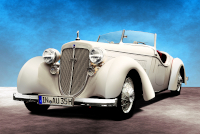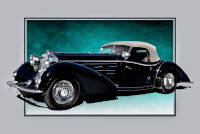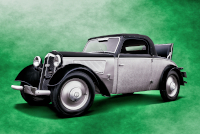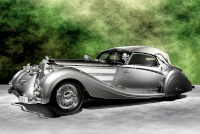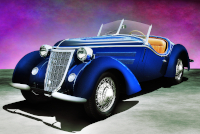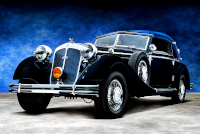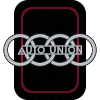
Auto Union
Established 1899: Cologne, GermanyLost in Translation: For our founding date, we reference the incorporation of Auto Union's oldest member, Horch, in its primitive state as A. Horch & Cie., which August Horch founded after three years working for Benz. Horch moved to Zwickau as early as 1903. Of course, after ouster from his namesake firm in 1909, August established a new company using the Latin derivation of his German surname, which is the infinitive of the verb 'to hear.' August translated 'horchen' to 'audire,' and matched the Latin imperative form to give us Audi.
Jørgen Skafte Rasmussen, a Danish industrialist with academic ties to Zwickau, later acquired Audi to add to his own DKW concern. Rasmussen continued to acquire automakers, including Horch and Wanderer. Then in the face of economic turmoil following the Great Depression, financiers pruned his empire down to these four marques, thereby creating Auto Union. Providing historical continuity, the four rings symbolic of the 1932 Auto Union merger form the Audi emblem of today. And August Horch himself rejoined the group as a board member, albeit a nominal role.
At 12cylinders, we'll put together a short Auto Union summary. Beyond reveling in its etymology, Auto Union became the classic era prototype for a modern day auto group. DKW produced motorcycles and economical front-drive cars. Wanderer served a broad population. Audi, an upper-middle market. And Horch trended toward the elite. The takeaway is that these brands worked together as a unified corporation in a way that was rare for the time, but would eventually become the industry standard. And though Auto Union product wasn't exported to the extent of their Mercedes-Benz rivals, the group paid attention to global trends, demonstrating French and American influence across the range.
Auto Union: Audi Front UW 225 Special Roadster, 1935
The recreation commissioned by Audi Tradition in 2009 for the marque's centennial, a peculiar front-drive roadster, though one of little history.
QI: 1.907 ★
4 images
Apr 10, 2025
Auto Union: Horch 853 Special Roadster, Erdmann & Rossi, #853278, 1936
The second of eight known Special Roadsters, an exquisite design restored to its correct factory specification using as much original componentry as possible.
QI: 4.907 ★ ★ ★
15 images
Mar 26, 2025
Auto Union: DKW F7 Meisterklasse Cabriolet Zweisitzer, #3059314, 1937
The 2-stroke, wood-framed, faux-leather wonder, a car built by a motorcycle magnate that forged an automotive empire.
QI: 1.483 ★
2 images
Mar 26, 2025
Auto Union: Horch 853 Sport Cabriolet, Voll & Ruhrbeck, #853558, 1937
Best of Show at the 2009 Pebble Beach Concours d'Elegance, an exercise in ornamental immensity.
QI: 3.366 ★ ★ ★
5 images
Mar 26, 2025
Auto Union: Wanderer W25K Sports Roadster, Wendler Karosserie, 1937
What began as counterpart to the BMW 328, the W25K might be the only pre-War German car built just for fun.
QI: 1.789 ★
4 images
Mar 26, 2025
Auto Union: Horch 853A Cabriolet, Gläser, 1939
Representative of Auto Union style, Gläser coachwork defines Audi and Horch cabriolets, and not without American influence.
QI: 1.908 ★
4 images
Mar 26, 2025

